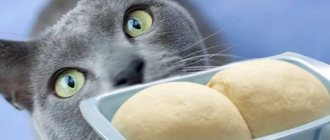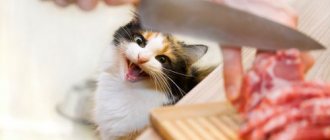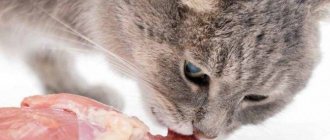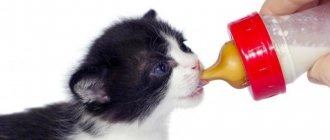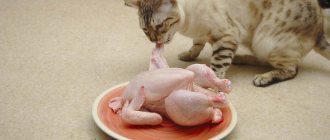Feeding a domestic cat often raises questions, especially if we are not talking about dry industrial food, but about natural products. After all, the common belief that a cat can only eat raw fish, milk and sour cream turns out to be wrong. Therefore, owners who care about the health and well-being of their pet, before treating it with any food, are interested in whether it is possible to give it to cats? The same can be applied to such a familiar product in the human diet as eggs. Do cats need it, and if so, in what form?
Is it possible or not?
Owners often give eggs or egg dishes to their pets, but aren’t they harmful to the cat’s body? Breeders and veterinarians who adore these animals have a unanimous opinion. They believe that cat eggs should be on the menu.
But opinions about what kind of eggs these should be – chicken or quail, boiled or raw – are largely ambiguous.
Contraindications
In some cases, it is better to refuse such a treat altogether. The following reasons may contribute to this:
- Product intolerance (often due to the fact that the body does not absorb protein).
- Allergy.
- During lactation and pregnancy, you should avoid raw foods.
- If the animals have reached old age.
- If your pet suffers from urolithiasis of phosphorus nature.
- For diseases of the kidneys, gall bladder, liver.
Then it is better to use natural nutrition, maintaining the necessary balance.
- Wet food for cats - rating of the best foods, an overview of their compositions and reviews of veterinarians (120 photos)
Proplan food for cats: analysis of the composition, veterinarian reviews, price and advice on choosing food (105 photos)
Hills food for cats: review of composition, recommendations for selection and tips for use in the diet (130 photos)
Give preference to yolk or white
Both raw and cooked products contain useful components - avidin (glycoprotein) and vitamin B7 (biotin), which have a positive effect on the pet’s coat. With enough of it, the fur becomes smooth, shiny, and the cat looks beautiful and well-groomed.
Another controversial question: should a cat be given the whole egg or just parts of it? Are yolks or whites healthy? Many believe that since the yolk does not contain avidin, which interferes with the absorption of vitamin B7, then it is better to give it to your pet. Quite often it is given separately, mixed with cow's milk.
But not everyone agrees with this; some owners prefer to give both the white and the yolk at the same time, but first beat them into a homogeneous mass. There is no consensus on this aspect.
Diet
A cat's diet should mostly consist of animal proteins .
For them, eggs are an additional source of protein, which is on par with meat and fish. Methionine, lysine, tryptophan are amino acids that are part of protein and are of great benefit to pets. Shiny coat, prolongation of the active period of life, good immunity, good mood, prevention of heart disease - this is all the merit of eggs. Any food must include a whole egg. In addition to proteins, they contain a large amount of vitamins and minerals, which ensure normal functioning of the entire body. Eggs are rich in phosphorus, calcium, iron and magnesium. Thanks to them, cats’ blood vessels and joints will be healthy, bones will be strong, and hormones will remain in balance.
Harm and benefit
A chicken egg contains protein, potassium, magnesium, vitamin D, phosphorus, sodium, iron and other useful microelements that promote healthy growth and proper development of the pet.
Benefits of eggs in a kitten's diet:
- an easily digestible product ensures a good mood and healthy sleep;
- strengthens the immune system, skeletal system and muscles;
- ensures normal functioning of the whole body;
- improves metabolic processes;
- restores nerve cells;
- normalizes brain activity;
- helps cleanse blood vessels;
- improves acid-base and hormonal balance;
- improves the condition of teeth and gums;
- increases the activity of kittens;
- has a beneficial effect on the condition of the coat, which acquires shine and silkiness.
Considering the list of beneficial properties, the question - can cats have boiled eggs becomes irrelevant, because the answer to it is quite obvious!
However, there are some disadvantages of this product. For example, egg white can cause allergic reactions in a pet, which is manifested by severe itching of the skin, upset stool and vomiting.
If such symptoms are detected, exclude protein from the cat’s diet! You can only leave the yolk on the menu, which is quite healthy and completely safe for animals prone to allergic reactions.
The best egg for a cat is chicken or quail
Experts consider the main advantages of quail eggs to be that they do not contain salmonella, which is the infectious agent of salmonellosis. In this case, you can give the product to the animal in its raw form. But with a caveat - the product must be of high quality.
Some unscrupulous manufacturers feed quails with feed containing harmful additives of chemical origin, including antibiotics. Such feeding leads to the fact that birds still become infected with this pathogen that penetrates the testicles.
One more positive point can also be noted - quail eggs contain more useful components than chicken eggs. Although their difference cannot be called significant. Owners also appreciate the small size of quail eggs - if a pet doesn’t eat a whole chicken egg, then he can certainly handle a small quail egg and won’t have to throw away the leftovers.
Feeding cats eggs - potential risks
Bacterial contamination is the first and most important risk you run when feeding eggs, especially raw eggs, to cats. For this reason, hard-boiled eggs are the safest option you have. Compared to this, even an omelette is less safe.
When it comes to digestion, no two cats are alike. Therefore, some may have a bad reaction to egg feeding, such as diarrhea and vomiting, while others may show no clinical signs at all.
Do not feed your cat eggs that you eat, especially if you have used any oil in preparing them or if you have added any spices or seasonings to the dish. The same goes for salt - cats should not eat salt if at all possible.
Fat cats or cats at high risk of obesity should not have eggs in their diet.
If you take your feline friend to the veterinarian's office and the veterinarian's blood tests show that your cat has high cholesterol, you should avoid feeding her eggs.
© shutterstock
Which is healthier: boiled or raw product for pussy?
There is no definite answer to this question. Remembering the wild origin of cats, they are, in theory, adapted to eat raw food, and their body must be prepared for this.
But still, Murka and Vaska are by no means “savages”; they have been pets for many centuries and have adapted to a new way. They live side by side with humans and often eat foods that they cannot get in the wild. Moreover, pets often “treat” themselves, without waiting for the generosity of the owner. Even some human diseases can be transmitted to cats... And many breeds have undergone long-term selection, but there is no need to remember their “wild” roots.
All this leads us to believe that it is better to boil your pet’s eggs to avoid digestive problems. After all, raw ones may contain helminth larvae, including worms, and this is in addition to salmonella.
Veterinary specialists, who know the danger of infection and the possible consequences, recommend once again to be on the safe side. Although, as in other products, the amount of nutrients in eggs decreases when cooked. The product can be given whole or finely chopped; the latter serving option is more preferable.
Benefits of eggs
In order for a cat to be provided with all the nutrients necessary for its body, it is necessary to diversify its diet. Although purrs are predators, they should not be fed only meat, since constant consumption of animal proteins can lead to gastrointestinal disorders, chronic liver and kidney diseases in your charges. It is better to add eggs containing easily digestible proteins to your pet's diet. They will also serve as a source of valuable amino acids that will slow down the aging process and improve the condition of the skin and coat.
Eggs contain a whole range of minerals:
- phosphorus;
- potassium;
- sodium;
- calcium;
- magnesium and others.
Thanks to this, their use will help strengthen the cats’ immune system and have a positive effect on the nervous, circulatory and cardiovascular systems. This is why high-quality cat foods contain eggs.
Many owners are interested in what a cat can eat: white or yolk. Quite often, purrs are fed only yolk to minimize the entry of avidin into their body. When boiled, this enzyme in the protein is destroyed, so it is recommended to give whole boiled eggs to cats.
How much product is needed for a pet?
When compiling a diet, owners usually calculate how much and what their cat needs. This is what nutritional balance is all about. Some believe that their pet needs 2 chicken or 4 quail eggs per week, while others give only half a chicken egg or one quail egg during the same period.
But it is best to choose a middle ground and give an adult cat one chicken egg or two quail eggs. When including this product in your diet, it is worth considering that it is quite allergic. Accordingly, you shouldn’t get carried away. When introducing an egg into the diet for the first time, you must start with a tiny piece, and then you should definitely observe the animal’s reaction. If everything is in order, then you can enter an integer.
If the cat turns up his nose
Just like people, cats have their own food preferences. And if you can’t pull some people away from this dish by the ears, others turn their noses up at it. The thing is that eggs have virtually no odor, so the cat may not pay much attention to them. You can help your pet recognize it by gently poking its nose at the product, thus showing that this food is completely safe and edible.
If this fails to convince the cat, then there is no need to insist. This means that the pet simply does not like eggs and it is worth looking for another way out of this situation. For example, a new product can be “camouflaged” by taking advantage of the fact that animals react to the aromas of the dish rather than its appearance. The egg can be grated and added to your usual dishes.
Some cats have a weakness for fried eggs. Of course, this is not the healthiest dish, since the presence of overcooked butter will not improve the health of the animal, and the owners are unlikely to prepare it separately for their purring gourmet, however, occasionally the pet can still be pampered.
In addition, you can give eggs with your favorite treats; your pet will hardly be able to resist. They can be mixed with minced meat, pieces of fish, liver or other product that the cat is partial to.
